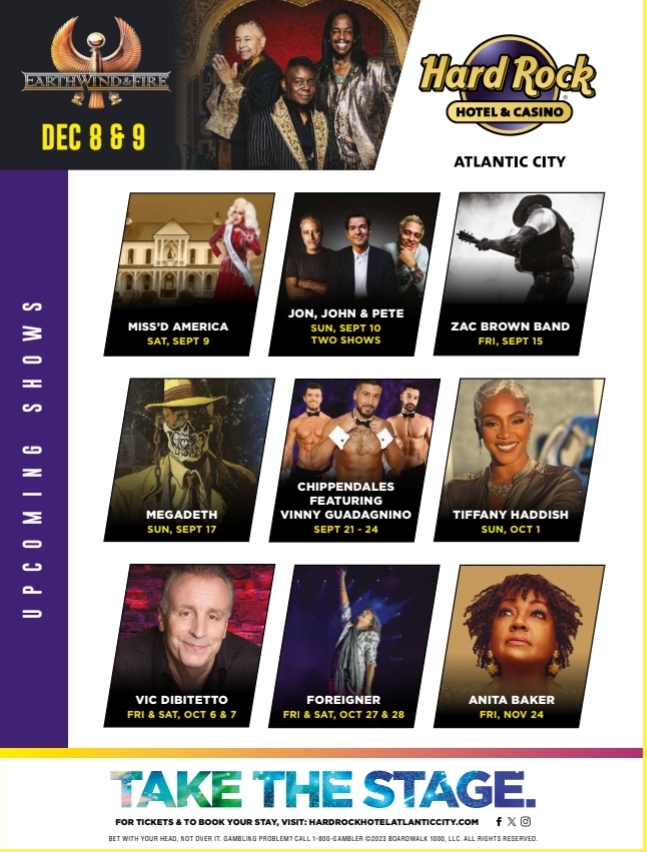‘The Sin Cities of the East’
Major Media Gets Wind of the Story
By Bill Kelly
With Levon and the Hawks and Conway Twitty at Tony Marts, Johnny Caswell and Tido Mambo at Bay Shores, Mike Pedicin, Sr. at Steele’s Ship Bar, the Under 21 Club bringing in big name recording stars like Dean Martin and Little Stevie Wonder, singing waiters at Your Father’s Mustache and the High Point on the circle, and live entertainment at most of the pubs and restaurants, Somers Point was running on all cylinders, with a good mixed crowd of young college kids, hippies and older folks filling the streets and sidewalks, especially Bay Avenue.

There were other similar scenes – Wildwood, Sea Isle City, Margate and Atlantic City all had their rock and roll strips, and many of the bands like Bill Haley & His Comets and the Carroll Brothers played them all. But Somers Point really stood out in the Summer of ’65 as people began to recognize that something special was happening, and those who heard about it just had to check it out for themselves.
The Christian island resort of Ocean City swelled to capacity; its hotels, motels, rooming houses and apartment rentals were sold out through Labor Day and college kids were sleeping in their cars and on the beach.

The 10,000 year-’round residents of Ocean City didn’t mind the financial windfall when the population of their small community swelled to more than 150,000 people. They made money renting rooms, selling t-shirts, ice cream, pizza and junk jewelry, and it only lasted from Memorial Day to Labor Day.
It was the estimated 20,000 college students made the most trouble, especially the hippies, parking their VW buses in one spot for three and four days at a time, playing loud music on the beach and Boardwalk, sleeping on the beach, and leaving piles of litter behind.
In Ocean City there was only one possible responsible official reaction – close the beaches at night and outlaw playing music on the beach and Boardwalk. One of the more conservative city commissioners proudly introduced a resolution to close the beaches and parking lots between 10 p.m. and 6 a.m., and outlaw the playing of music on the beach and Boardwalk.
On the other side of the causeway, the 2-square-mile mainland city of Somers Point was more tolerant of the sudden influx of tourists and college kids, as they had a special 30-man summertime police force – Lynford “Lynn” Bader’s Raiders, who kept order along Bay Avenue.
People still complained about the noise, the traffic jams, the lack of parking and drunks urinating on lawns, but when they complained at City Council meetings someone from the Somers Point Beverage Association always spoke up, saying something like, “Hey, you don’t buy a home next to an airport and then complain about the airplanes.”
Soon it became a news story. You can’t have all this happening at the same time and at the same place without the media getting wind of it.
The local weekly newspapers first reported the introduction of official city resolutions closing the beaches to the public at night and banning the playing of music on the beach and Boardwalk. These news reports raised the eyebrows of local and regional daily news editors.
The Camden Courier Post got the scoop when it reported all about it under the headline: “Thirsty Teen Throngs Besiege Point,” with the subheading of: “Saturday Night at the Point – Youth Capital of South Jersey – the Magic Number 21 – When Boy Meets Girl.”
Then The Philadelphia Inquirer and The Evening Bulletin, another daily out of Philly, did major news stories. Soon The New York Times chimed in, “A New Look Slowly Comes to the Jersey Shore – Some Abrupt and Flamboyant.”
It went national when Life Magazine made it a photo-feature cover story that proclaimed Ocean City and Somers Point to be were joined at the hip as the “Sin Cities of the East.”
That made it an even more popular destination for those who wanted to partake in the sinning or just gawk at the side shows and tell their kids, “See, this is what you can’t ever do.”
Philadelphia broadcast media including KYW TV News also began talking about it, especially after a Philadelphia Magazine feature article appeared.

KYW was the newest of three broadcast network affiliated TV stations in Philadelphia at the time, and they wanted to make a splash, so they put together a documentary film crew they called the Investigative Unit which won awards for reports on nursing home abuse, insurance fraud and mob controlled unions. Now they were looking for a new assignment and they knew their boss didn’t have one ready for them.
The lead field director, David Brenner, a local South Philly boy, held up the newspaper clips in one hand and the magazines in the other and made the pitch to his boss, saying, “This is a great story. The college kids take over, the officials want to outlaw music and close the beaches. We couldn’t make this up and get people to believe it.”
“Okay, okay,” said the senior executive producer, “but I don’t want to just repeat this crap about everybody having such a good time and the music and dancing and beach blanket bingo. I want a story, a real story, and from all this noise we’re getting, there’s got to be a good story down there somewhere. But you don’t have it yet so you have to dig in the sand to get it, but don’t come back with the same junk the Inky and others put out.”
Brenner clapped his hands, shook the hand of the executive producer, kissed him on both cheeks and promised him a good story. Then as he got to the office door, he stopped and turned around, “Correct that – we’ll get a G-R-E-A-T- story,” he spelled it out, almost dancing out the door.
Walking across the newsroom, he walked into a small conference room where there were three people waiting for him – two young men and a young woman: Brenner’s secretary, the on-air reporter Tom Snyder, and the cameraman/technician who made up Brenner’s Investigative Unit crew.
“We’re going to the Shore,” Brenner said smiling, “We’re going to the Jersey Shore!”
“Hot damn,” the cameraman said, “I was getting tired of these nursing home and mob stories. Maybe we can finally have some fun in the sun.”
“I don’t know how much sun I can take,” Snyder said shyly and dryly, “or how much of your fun I can take.”
Brenner slapped Snyder with a towel, put him in a head lock and began screwing his fist into the top of Snyder’s head giving him a hard nuggie while laughing and looking at the others, “Do you think he’s serious or not? I can’t tell sometimes.”
“The bad news is,” the secretary paused for effect. “The bad news is there are no rooms available for anywhere within 20 miles of Ocean City, – it’s booked solid.”
“But the good news is,” she smiled. “My parents have a summer home in Ocean City and they said we can stay there, though somebody might have to sleep on the couch.” Everybody looked at Tom Snyder and laughed.
“No, I’ll take the couch,” the cameraman said, swinging a pack of electronic gear over his shoulder.
They left immediately, over Snyder’s protests, without packing. “I’ll buy you a t-shirt and bathing suit on the Boardwalk – that’s all you’ll need,” Brenner said, noting that with a thousand dollars in cash budget, and not needing to rent a motel room, they had plenty of money for accessories.
So Brenner, his secretary, cameraman and Snyder piled into a white KYW van packed with broadcast equipment and headed down the Shore not knowing exactly what their story was going to be, but with high anticipation and the expectation that whatever happened, it was going to be a really good – check – make that a really great time.
And yes, it is David Brenner the comedian who was an award-winning documentary film producer for KYW TV before he became a celebrity, and yes, Tom Snyder was the rookie, first-year on-air street reporter at KYW TV when he accompanied Brenner to find a story in the vibrant Ocean City–Somers Point scene.
Brenner once related the story of what happened on that assignment to Johnny Carson during one of his appearances on “The Tonight Show,” and later fondly reminisced about it with Tom Snyder on his “Tomorrow” late night talk show, which was humorously parodied by Dan Akyroid on “Saturday Night Live.”
“The Long, Cool Summer” was the title of their one-hour 16mm documentary film that aired on KYW TV 3 a week after Labor Day which reportedly won additional awards for them. It is said to be stored and archived in a cold storage vault in the media library at the Urban Archives at Temple University in Philadelphia.
It could provide an actual documentary film footage of all that transpired.










